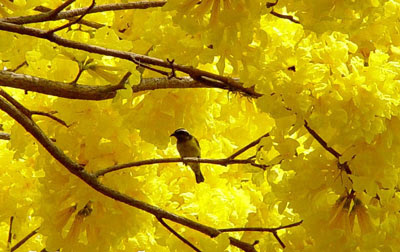 Lake Maracaibo oil slicks: few seem to care.
Lake Maracaibo oil slicks: few seem to care.Oil operations in the Lake of Maracaibo started in the 1930’s and have been continuous ever since. During these 80 years of activities thousands of wells have been drilled in and around the lake. Today there are over one thousand active wells in the lake area, there are multiple production stations and about 40,000 kilometers of two and four inch pipelines lying on the lake bed, many of them carrying oil. As time goes by, corrosion has taken its toll and leakages have increasingly taken place. Petroleos de Venezuela, the Venezuelan state-owned oil company, admits that there are about 2,300 pipeline ruptures per year in this spaghetti-like maze of pipelines crossing the bottom of the lake. See also www.petroleumworld.com , April 9, 2008.
In order to remedy this situation the company started, in 2008, a program of repairs of these pipelines. Jose Luis Parada, General Manager of PDVSA, Western Division, said to NNN/Latin News in May 2007 that this plan would start the following year. To this effect the Panamanian flag vessel “Gulmar Eagle” was contracted to conduct a survey of the bottom of he lake and help repair the leakages and ruptures of pipelines that could be found in the bed of the lake. The services of this vessel were later reinforced with the contracting of two more vessels, which carried out surveys of the lake bottom in order to locate more leakages and discarded material. A report on this work can be seen in The Sea Scape surveyor, July 2008, volume 4. This publication reported that the two other specialized vessels used on the project were the “Adams Arrow” and “Miss Laura”, besides the DSV “Gulmar Eagle”. The "Adams Arrow" performed surveys over an area of almost 900km2 and located hundreds of pipelines, platforms and sub sea structures, including 12 platforms previously unknown. The survey campaign was expected to continue for another 6 months, while the follow up work in leak repairs was expected to continue for the next five years.
However, in 2009, Hugo Chavez had the bright idea to “nationalize” all contractors working in the lake, in order to preserve what he called “national sovereignty”. PDVSA moved to confiscate the three vessels that had been working to help them. Needless to say, these activities stopped and the owners of the vessels had to spend five long months negotiating their release with PDVSA kidnappers, losing significant amounts of money in the process. It was only in December 2009 that the vessels were finally released from the grasp of the Chavez government and were allowed to sail to Panama and the U.S.
As a result of this untimely intervention the program of lake bottom pipeline repairs collapsed. A few months later multiple oil and gas leaks have appeared in the lake, now having no maintenance program to speak of. The oil leakages started in several sectors in the western side of the lake and have progressively migrated to its eastern coast. More recently, gas leakages have also been reported. Maracaibo newspapers report up to 13 different leaks in the lake. A few fishermen and citizens are protesting this new mismanagement of our national resources but the state oil company, PDVSA, has pretended that they have no responsibility in this situation. The president of the company, a mediocre politician called Rafael Ramirez, claims that the leakages are "the work of unidentified saboteurs". This is a standard strategy of the regime. Everything that goes wrong in the country is the work of satanic forces such as the CIA or the political opposition. Although Chavez has denounced 27 attempts on his life no potential “assassin” has ever been caught but, just in case, no one is allowed to approach Chavez with a can of insecticide in their hands.
Although the extent and dimensions of the oil spills are nowhere to be compared in magnitude to the Macondo well tragedy in the Gulf of Mexico it is also true that, while the Macondo well has been a single tragedy, the Lake of Maracaibo multiple spills represent a chronic problem that is threatening with killing the lake.
In addition to these spills lake contamination is also due to industrial and residential discharges, mostly from the more populated western coast of the lake and to a parasitic vegetable called Lemma that extends rapidly on the surface of the lake, robbing the fish of oxygen.
The revolutionary regime of Hugo Chavez is really destroying the country under the impotent and/or indifferent eyes of millions of passive Venezuelans lacking a civic attitude. For them what is important is to receive the handouts of the paternalistic regime, rather than being concerned about the somewhat diffuse notion of nation. This is a notion that belongs in the future, while their day-to-day survival represents the here and now.

1 comentario:
Good brief and this mail helped me alot in my college assignement. Thanks you seeking your information.
Publicar un comentario